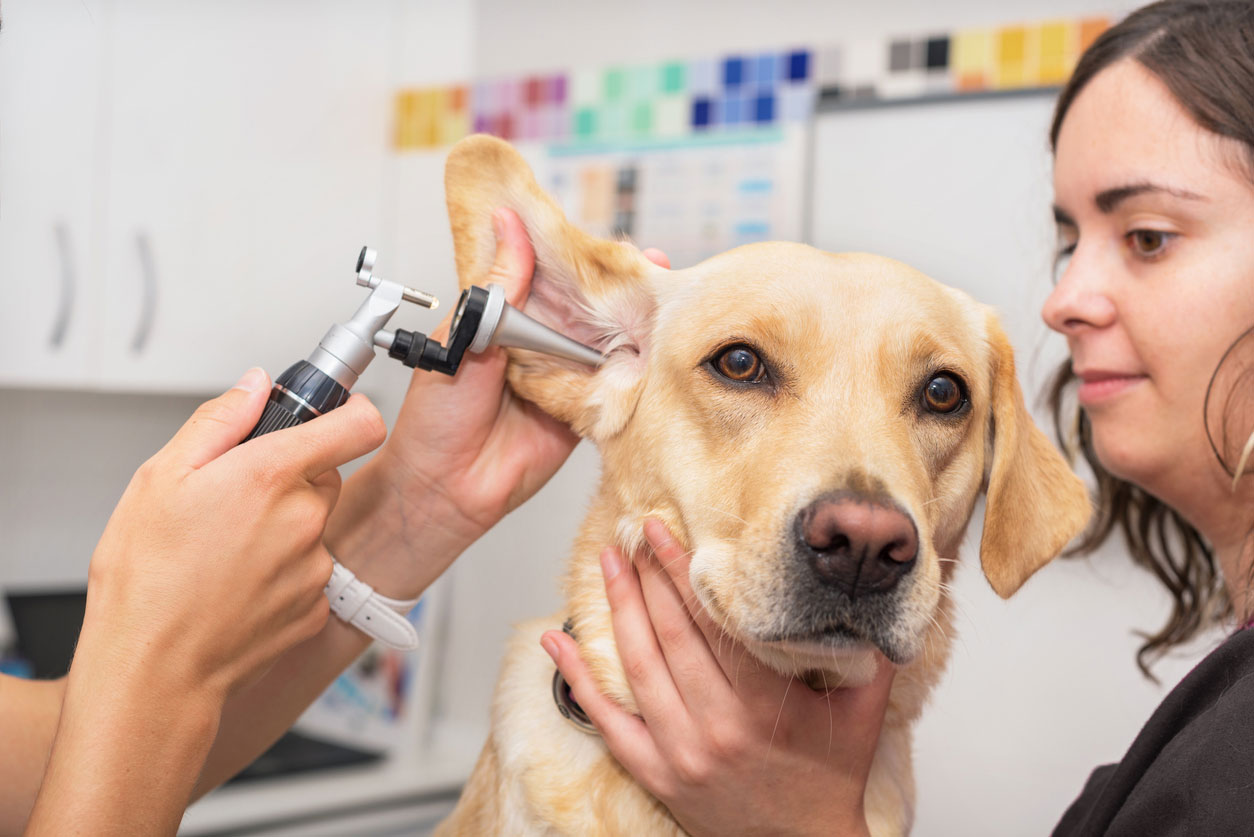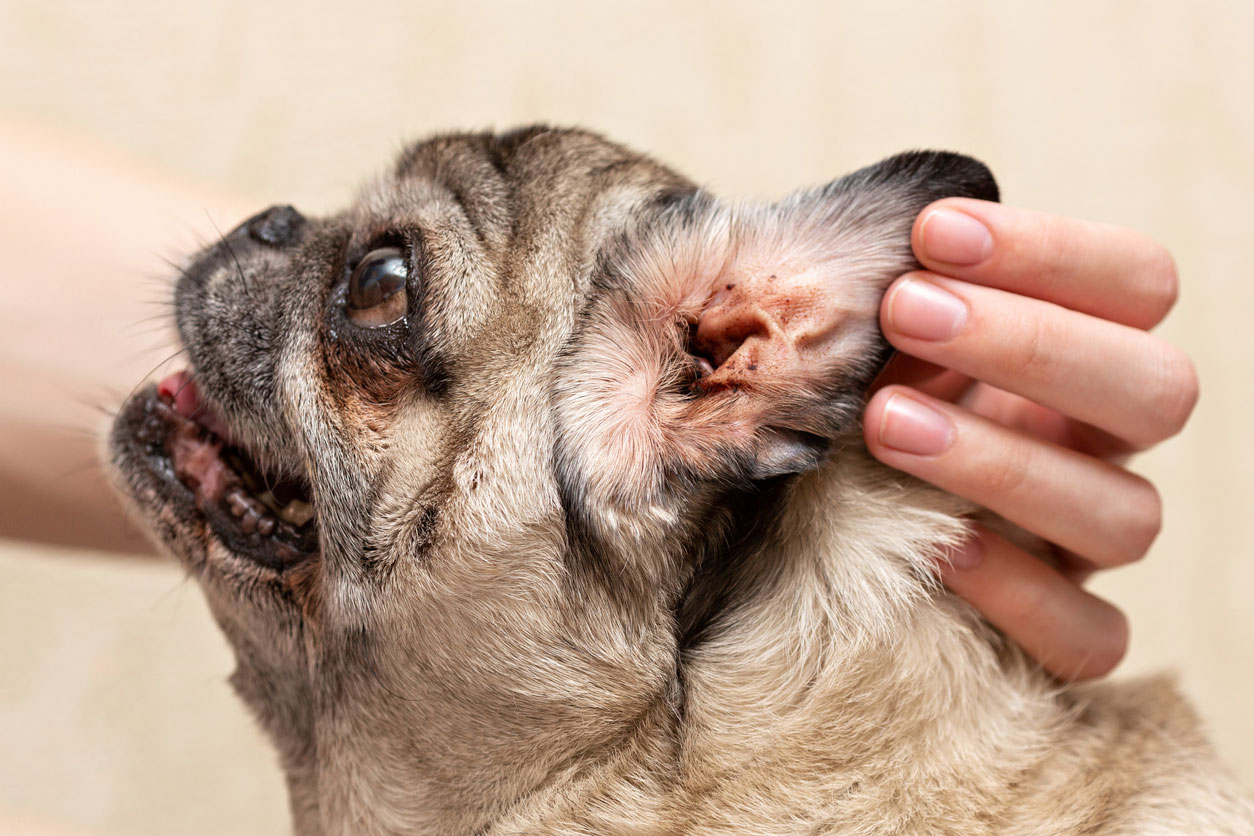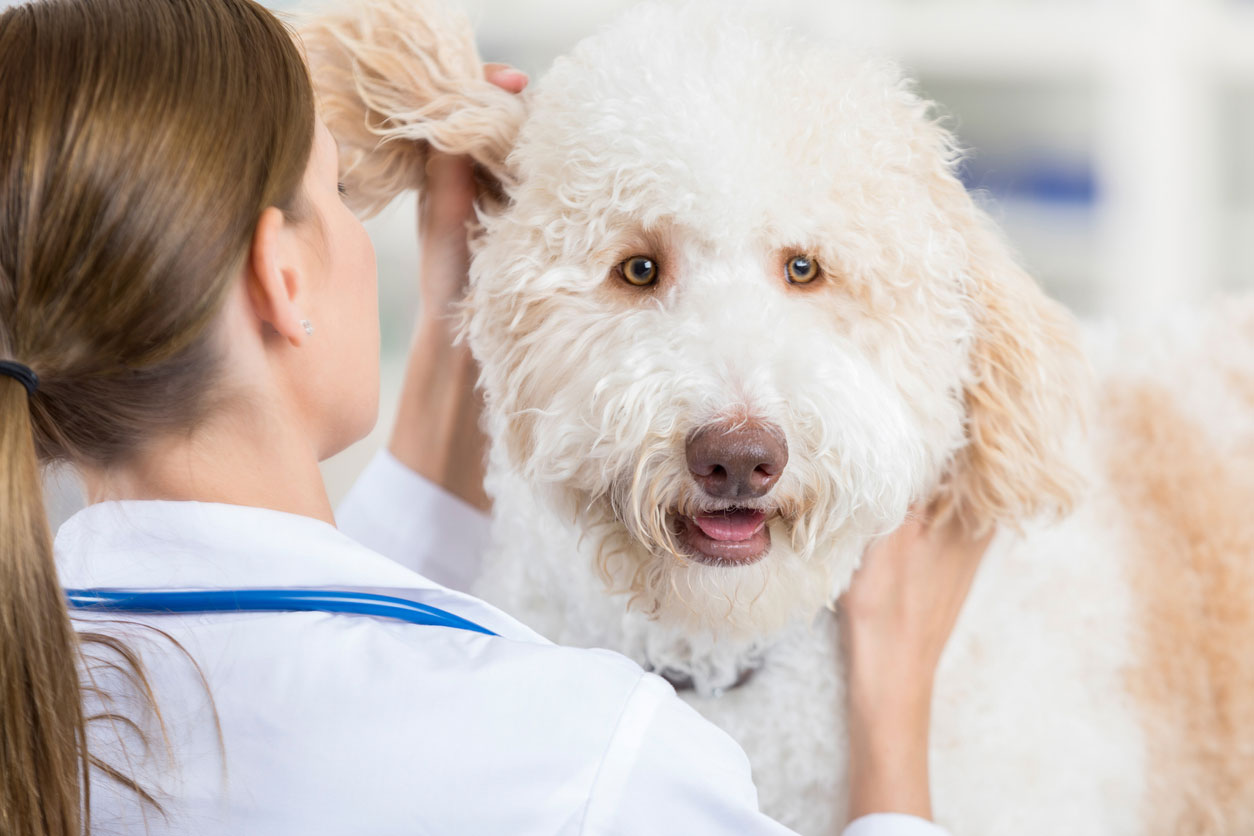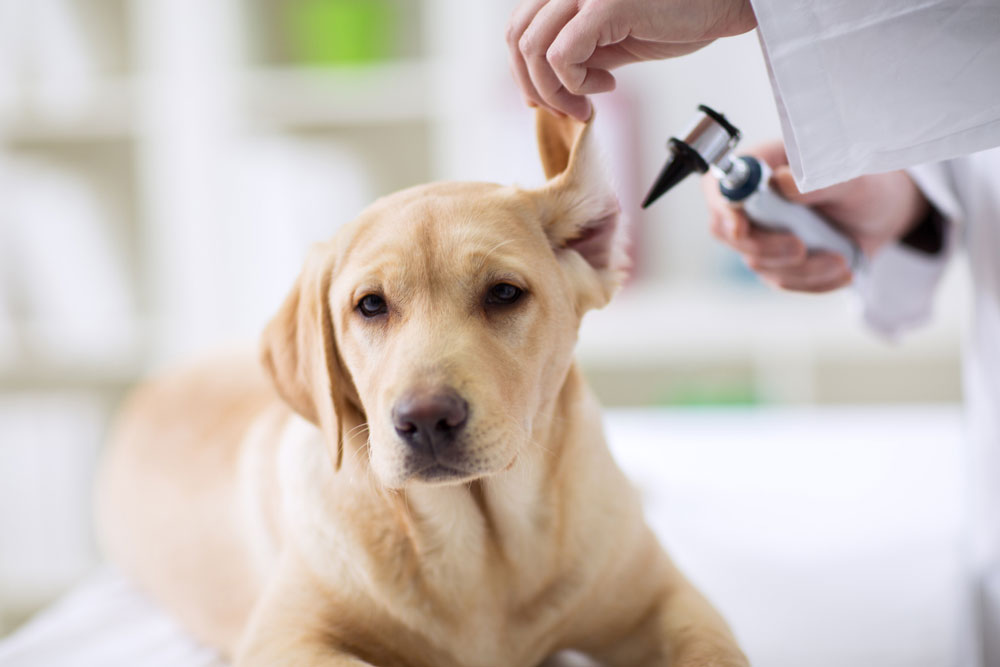Scratch, scratch, scratch.
Itchy ears can be a chronic and frustrating problem for pets and their owners alike. Inflamed or infected ears cause pets obvious discomfort that can leave owners feeling helpless and concerned. In addition, a pet’s various attempts at relieving the itch in the ears (e.g., scratching, face rubbing, head shaking) can disrupt their sleep and normal activities.

Why are my pet’s ears so itchy?
Ear issues can arise for many reasons, and your veterinarian will have to examine your itchy pet to be able to confirm an accurate diagnosis. Your veterinarian will assess your pet’s external and internal ear canal, perform a microscopic assessment (i.e., cytology) of discharge, and determine the root cause—without which, treatment will be ineffective at best, and harmful at worst. Common causes for pets’ itchy ears include:
- Bacterial or fungal infections — Your pet’s ears have a natural balance of a small amount of bacteria and yeast that are normal inhabitants. Environmental conditions such as canals are warm, dark, moist environments – a natural breeding ground for bacteria and yeast. Water (e.g., from bathing or swimming) trapped in your pet’s ear canal can accelerate bacterial growth.
- Allergies — Environmental allergens (e.g., grasses, tree pollen) and food allergies can cause the normal balance in the ear to be disrupted, which results in skin disorders, including chronic ear infections.
- Injury — Aural hematomas are blood- or fluid-filled pockets that develop inside on the ear flap in response to trauma (e.g., excessive head shaking, ear scratching, rough play).
- Trapped hair or debris — Certain breeds, such as poodles and shih tzus, have inner ear hair that can become matted with debris or wax, preventing normal air flow.
- Foreign objects — Seeds, grass awns, and ticks can burrow in the skin and create irritation.
- Tumors or polyps — Tissue growths can irritate the ear and create an additional surface area for bacteria and yeast to grow.
- Waxy buildup — Excessive ear wax can accumulate in the ear canal and irritate your pet’s ears.
- Ear mites — Your pet can contract parasitic ear mites through close contact with an infested pet. These extremely irritating microscopic mites feed on skin oils and ear wax. This condition is typically seen in young puppies and kittens.

How will I know if my pet has an ear problem?
Although occasional scratching is normal for pets, frequent or prolonged scratching is often the first indicator that your pet’s ears are causing them discomfort. Additional signs can include:
- Head shaking
- Head tilt
- Unusual odor
- Face or ear rubbing on carpet or furniture
- Ear sensitivity
- Head-shyness (e.g., avoids petting, physical contact)
- Depression
- Irritability
- Ear debris
- Thickened ear flap (i.e., pinna)
- Swollen or thickened ear tissue (i.e., cauliflower ear), possibly blocking the ear canal
- Decreased appetite

Are some pets prone to ear issues?
All dogs and cats can suffer from various ear conditions, but certain characteristics and activities make some breeds and mixes more likely to suffer from chronic issues, including:
- Long-eared breeds — Long ears do not allow for healthy air circulation and trap moisture and debris.
- Brachycephalic (i.e., flat-faced) breeds — These breeds have narrow ear canals and are also prone to middle ear issues.
- Frequent bathing or swimming — Water can enter the ear canal and create a moist environment for bacteria or yeast to flourish.
Owners with at-risk pets should perform weekly ear cleanings at home, and after bathing or swimming. Your veterinarian can recommend an appropriate ear cleaner that includes a drying agent.
How will my veterinarian treat my pet’s itchy ears?
Depending on your pet’s diagnosis, your veterinarian will develop a customized treatment plan to reduce ear inflammation, ease your pet’s discomfort, and eliminate the cause or trigger. If your pet’s ears are exceedingly sensitive, and they cannot tolerate an awake examination, your veterinarian may recommend a sedated ear flush (i.e., deep cleaning) and examination to better visualize your furry pal’s ear canal and ear drum.

Your pet may need several veterinary visits or treatment trials to ensure an effective solution, so remain patient, and follow each step of your veterinarian’s instructions. Your pet’s treatment plan may include:
- Antibiotic or antifungal topical ear medication
- Oral medications (e.g., antibiotics, anti-inflammatories)
- Deep cleaning (i.e., ear flush, potentially under sedation for especially painful pets)
- At-home ear cleaning regimen
- Antiparasitic medication to treat mites or ticks
- Food allergy trial or a novel protein diet
- Allergy medication for environmental allergies
- Surgery to remove a tumor or foreign body, or to drain a hematoma
- One or more follow-up appointments to ensure progress and healing, preventing recurrence
Pets with severe chronic ear changes (e.g., thickening, recurring infections, middle ear fluid) may require a more advanced surgical procedure—ear canal removal. Although this procedure sounds radical, veterinarians perform this surgery often, because ear canal removal may be the only way to provide relief for long-suffering pets whose other treatments were all unsuccessful.

How can I improve my pet’s ear health?
Consider your pet’s ears as an extension of their skin—cleanliness and air flow can promote health and minimize microorganism growth. Your pet’s routine ear care should include:
- Cleaning their ears weekly
- Preventing water from entering their ear canal
- Maintaining routine veterinary care
- Reducing ear canal hair (e.g., poodles, shih tzus)
- Scheduling an appointment with your regular veterinarian at the first sign of a problem
Pets’ itchy ears are more than an inconvenience—untreated or recurring infections and pain can challenge their immune system, lead to secondary complications, and negatively affect your furry companion’s quality of life. If your pet experiences frequent ear infections or irritation, talk to your veterinarian about treatment and management options.
For those times when your pet’s all-night ear scratch-a-thon begins after your regular veterinarian’s business hours, our UrgentVet team can help. UrgentVet provides convenient access to expert veterinary care when your pet needs it most—including late at night. Contact an UrgentVet near you—because your pet can’t wait to feel better.






